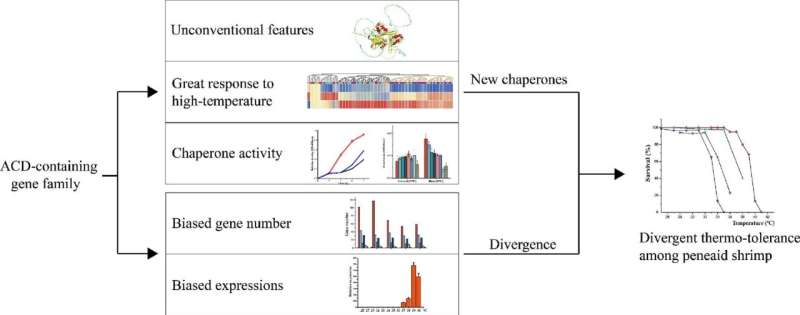This article has been reviewed according to Science X's editorial process and policies. Editors have highlighted the following attributes while ensuring the content's credibility:
fact-checked
peer-reviewed publication
trusted source
proofread
Study reveals genetic mechanism of divergent thermo-tolerance in penaeid shrimp

As worldwide economical aquaculture species, penaeid shrimp is vulnerable to temperature, and different species exhibit divergent thermo-tolerances.
Recently, a research team led by Prof. Li Fuhua from the Institute of Oceanology of the Chinese Academy of Sciences (IOCAS) provided new insights into the genetic mechanism of divergent thermo-tolerance in penaeid shrimp.
The study was published in Science of The Total Environment.
The researchers found that the α-crystallin domain-containing (ACD-containing) gene family exhibited a significant expansion in penaeid shrimp species in comparison with other crustaceans. These genes are mainly expressed in the muscle of shrimp. Unlike typical small heat shock proteins, the ACD-containing proteins in penaeid shrimp contain additional ACD domains, resulting in larger molecular weight and more complex 3D structure.
They detected their responses to high temperature through RNA-sequencing and quantitative reverse-transcription polymerase chain reaction. Heterologous expression in Escherichia coli and citrate synthase assays of three representative ACD-containing genes confirmed that their chaperone activity could enhance thermo-tolerance.
"Compared with penaeid shrimp species with a relatively low thermo-tolerance (Fenneropenaeus chinensis and Marsupenaeus japonicus), the thermo-tolerant species (Litopenaeus vannamei and Fenneropenaeus indicus) contained more ACD-containing genes, which resulted from tandem duplications in their genomes," said Prof. Zhang Xiaojun, a co-author of the study. "In addition, they exhibited biased expression levels under high temperatures."
These expanded ACD-containing genes of penaeid shrimp served as new chaperones. Besides, they underwent independent expansion in thermo-tolerant penaeid shrimp, and finally contributed to their divergent thermo-tolerance phenotypes and adaptations to the ecological environment, as noted by Dr. Zhang Xiaoxi, first author of the study.
"Our work provides important insights into the mechanisms by which penaeid shrimp survive in adverse environments. It may be helpful for aquaculture industry and genetic breeding of shrimp with high adaptability to the environment," added Prof. Li.
More information: Xiaoxi Zhang et al, ACD-containing chaperones reveal the divergent thermo-tolerance in penaeid shrimp, Science of The Total Environment (2023). DOI: 10.1016/j.scitotenv.2023.163239
Journal information: Science of the Total Environment
Provided by Chinese Academy of Sciences



















